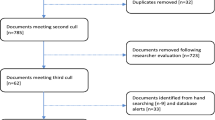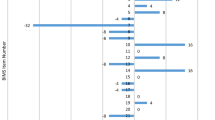Abstract
Lesson study is highly regarded as a model for professional learning, yet remains under-theorised. This article examines the professional learning experiences of teachers and numeracy coaches from three schools in a local network of schools, participating in a lesson study project over two research cycles in 2012. It maps the interconnections between their experiences and their beliefs and practices, using Clarke and Hollingsworth’s (Teach Educ 18(8):947–967, 2002) Interconnected Model of Professional Growth. Analysis of interview data and video-recordings of planning meetings, research lessons, and post-lesson discussions reveals the development of teachers’ collaborative planning skills, increased attention to students’ mathematical thinking, use of orchestrated whole-class discussion based on anticipated student solutions and focused questioning, and the enhancement of collaborative practices for teacher inquiry. Our findings illuminate the interplay between the External Domain, the Personal Domain, the Domain of Practice, and the Domain of Consequence, in the teaching and learning change environment, and the mediating processes of enactment and reflection. Changes in the domains across the period of the lesson study provide evidence of teachers’ professional growth, with the iterative processes of enactment and reflection being critical in mediating this professional growth.






Similar content being viewed by others
Notes
Numeracy coaches are teachers who were nominated by the school principal to undertake ongoing professional learning for mathematics curriculum leadership and coaching. The ongoing professional learning involves professional conversations with other coaches in the network of schools.
All names of participants are pseudonyms.
INT1 refers to Interview 1. Similar notation is used for Planning Meeting 1 (PM1), Cycle 1 (C1), etc.
Trevor was a member of the Matomes team.
References
Borko, H. (2004). Professional development and teacher learning: Mapping the terrain. Educational Researcher, 33(8), 3–15.
Borko, H., Koellner, K., & Jacobs, J. (2014). Examining novice teacher leaders’ facilitation of mathematics professional development. Journal of Mathematical Behavior, 33, 149–167.
Chokshi, S., Ertle, B., Fernandez, C., & Yoshida, M. (2001). Lesson study protocol. Lesson Study Research Group. From http://www.tc.columbia.edu/lessonstudy/tools.html.
Clarke, D., & Hollingsworth, H. (2002). Elaborating a model of teacher professional growth. Teaching and Teacher Education, 18(8), 947–967.
Corbin, J. M., & Strauss, A. L. (2008). Basics of qualitative research [electronic resource]: Techniques and procedures for developing grounded theory. London: SAGE.
da Ponte, J. P. (2013). Theoretical frameworks in researching mathematics teacher knowledge, practice, and development. Journal of Mathematics Teacher Education, 16(5), 319–322. doi:10.1007/s10857-013-9249-0.
Darling-Hammond, L., & Richardson, N. (2009). Teacher learning: What matters. Educational Leadership, 66(5), 46–55.
Downton, A., Knight, R., Clarke, D., & Lewis, G. (2006). Mathematics assessment for learning: Rich tasks and work samples. Melbourne: Mathematics Teaching and Learning Center ACU.
Elliott, J. (2012). Developing a science of teaching through lesson study. International Journal for Lesson and Learning Studies, 1(2), 108–125.
Fernandez, C. (2002). Learning from the Japanese approach to professional development: The case of lesson study. Journal of Teacher Education, 53(5), 393–405.
Fujii, T. (2014). Implementing Japanese lesson study in foreign countries: Misconceptions revealed. Mathematics Teacher Education and Development, 16(1), 65–83.
Goldsmith, L. T., Doerr, H. M., & Lewis, C. C. (2014). Mathematics teachers’ learning: A conceptual framework and synthesis of research. Journal of Mathematics Teacher Education, 17(1), 5–36.
Groves, S., & Doig, B. (2010). Adapting and implementing Japanese lesson study - some affordances and constraints. In Y. Shimizu, Y. Sekiguchi, & K. Hino (Eds.), The proceedings of the 5th East Asia regional conference on mathematics education: In search of excellence of mathematics education (pp. 699–706). Tokyo, Japan: Japan Society of Mathematics Education (JSME).
Groves, S., Doig, B., Widjaja, W., Garner, D., & Palmer, K. (2013). Implementing Japanese lesson study: An example of teacher-researcher collaboration. The Australian Mathematics Teacher, 69(3), 10–17.
Guskey, T. R. (1986). Staff development and the process of teacher change. Educational Researcher, 15(5), 5–12.
Guskey, T. R., & Yoon, K. S. (2009). What works in professional development. Phi Delta Kappan, 90(7), 495–500.
Hargreaves, A., & Fink, D. (2003). Sustaining leadership. Phi Delta Kappan, 84(9), 693–700.
Hollingsworth, H., & Oliver, D. (2005). Lesson study: A professional learning model that actually makes a difference. In J. Mousley, L. Bragg, & C. Campbell (Eds.), Mathematics—Celebrating achievement. Proceedings of 2005 MAV conference (pp. 168–175). Melbourne: Mathematical Association of Victoria.
Hunter, J., & Back, J. (2011). Facilitating sustainable professional development through lesson study. Mathematics Teacher Education and Development, 13(1), 94–114.
Joubert, M. V., & Sutherland, R. J. (2009). Exploring effective professional development for teachers of mathematics. Retrieved from https://www.ncetm.org.uk.
Knapp, A., Bomer, M., & Moore, C. (2011). Lesson study as a learning environment for coaches of mathematics teachers. In L. C. Hart, A. S. Alston, & A. Murata (Eds.), Lesson study research and practice in mathematics education (pp. 153–164). New York: Springer.
Lewis, C., Perry, R., & Hurd, J. (2009). Improving mathematics instruction through lesson study: A theoretical model and North American case. Journal of Mathematics Teacher Education, 12(4), 285–304.
Lewis, C., Perry, R., & Murata, A. (2006). How should research contribute to instructional improvement? The case of lesson study. Educational Researcher, 35(3), 3–14.
Lewis, C., & Tsuchida, I. (1998). A lesson is like a swiftly flowing river: How research lessons improve Japanese education. American Educator, 12(Winter), 12–17. (50–52).
Matos, J. F., Powell, A., Sztajn, P., Ejersbø, L., & Hovermill, J. (2009). Mathematics teachers’ professional development: Processes of learning in and from practice. In R. Even & D. L. Ball (Eds.), The professional education and development of teachers of mathematics (pp. 167–183). New York: Springer.
Miles, M. B., & Huberman, A. M. (1994). Qualitative data analysis: An expanded sourcebook (2nd ed.). Thousand Oaks: Sage Publications.
Murata, A. (2011). Introduction: Conceptual overview of lesson study. In L. C. Hart (Ed.), Lesson study research and practice in mathematics education (pp. 1–12). Berlin: Springer.
Opfer, V. D., & Pedder, D. (2011). Conceptualizing teacher professional learning. Review of Educational Research, 81(3), 376–407.
Perry, R. R., & Lewis, C. C. (2008). What is successful adaptation of lesson study in the US? Journal of Educational Change, 10, 365–391.
Pierce, R., & Stacey, K. (2011). Lesson study for professional development and research. Journal of Science and Mathematics Education in Southeast Asia, 34(1), 26–46.
Puchner, L. D., & Taylor, A. R. (2006). Lesson study, collaboration and teacher efficacy: Stories from two school-based math lesson study groups. Teaching and Teacher Education, 22, 922–934.
Remillard, J. T. (2000). Can curriculum materials support teachers’ learning? Two fourth grade teachers’ use of a new mathematics text. Elementary School Journal, 100(4), 331–350.
Ricks, T. (2011). Process reflection during Japanese lesson study experiences by prospective secondary mathematics teachers. Journal of Mathematics Teacher Education, 14(4), 251–267.
Shimizu, Y. (2013). Participating in lesson study to share new visions and immutable values: A Japanese approach to lifelong development of mathematics teachers. In S. Herbert, J. Tillyer, & T. Spencer (Eds.), Mathematics: Launching futures, proceedings of the 24th biennial conference of the Australian Association of Mathematics Teachers Inc. (pp. 22–35). Adelaide, SA: The Australian Association of Mathematics Teachers (AAMT) Inc.
Sprinthall, N. A., Reiman, A. J., & Thies-Sprinthall, L. (1996). Teacher professional development. In J. Sikula, T. J. Buttery, & E. Guyton (Eds.), Handbook of research on teacher education (2nd ed., pp. 666–703). New York: Macmillan.
Stigler, J. W., Gonzales, P., Kawanaka, T., Knoll, S., & Serrano, A. (1999). The TIMSS videotape classroom study: Methods and findings from an explanatory research projects on eighth-grade mathematics instruction in Germany, Japan and the United States. Washington, DC: US Government Printing Office.
Stigler, J. W., & Hiebert, J. (1999). The teaching gap: Best ideas from the world’s teachers for improving education in the classroom. New York: The Free Press.
Takahashi, A. (2006). Characteristics of Japanese mathematics lessons. Retrieved 10 September 2008 from http://www.criced.tsukuba.ac.jp/math/sympo_2006/takahashi.pdf.
Takahashi, A., Lewis, C., & Perry, R. (2013). A US lesson study network to spread teaching through problem solving. International Journal for Lesson and Learning Studies, 2(3), 237–255.
Takahashi, A., & Yoshida, M. (2004). Ideas for establishing lesson-study communities. Teaching Children Mathematics, 10(9), 436–443.
Takahashi, A. (n.d.). Implementing lesson study in North American schools and school districts. Online at http://hrd.apec.org/images/a/ae/51.2.pdf. Retrieved 11 Nov 2014.
Tall, D. (2008). Using Japanese Lesson Study in teaching mathematics. Scottish Mathematical Council Journal, 38, 45–50.
Vale, C. (2013). Primary teachers’ algebraic thinking: An example from Lesson Study. In V. Steinle, L. Ball & C. Bardini (Eds.), Mathematics education: Yesterday, today and tomorrow (Proceedings of the 36th annual conference of the Mathematics Education Research Group of Australasia). Melbourne: MERGA.
Watanabe, T. (2002). Learning from Japanese lesson study. Educational Leadership, 59(6), 36–39.
White, P., Wilson, S., & Mitchelmore, M. (2011). Teaching for abstraction: Collaborative teacher learning. In J. Dindyal, L. P. Cheng, & S. F. Ng (Eds.), Mathematics education: Expanding horizons (Proceedings of the 35th annual conference of the Mathematics Education Research Group of Australasia) (pp. 761–768). Singapore: MERGA.
Widjaja, W., & Vale, C. (2013). Deepening teachers’ understanding of content and students’ thinking: The case of Japanese Lesson Study in Australian primary classrooms. In M. Inprasitha (Ed.), The 6th East Asia regional conference on mathematics education (EARCOME 6): Innovations and exemplary practices in mathematics education (Vol. 3, pp. 266–275). Phuket, Thailand: Center for Research in Mathematics Education.
Xu, H., & Pedder, D. (2015). Lesson study: An international review of the research. In P. Dudley (Ed.), Lesson study: Professional learning of our time (pp. 29–58). Abingdon, Oxon: Routledge.
Acknowledgments
The Implementing structured problem-solving mathematics lessons through lesson study project was funded by the Centre for Research in Educational Futures and Innovation, Deakin University. We gratefully acknowledge the contributions of participating teachers, coaches, students, schools, and the outside experts: Dr Max Stephens, University of Melbourne, and Professor Toshikiara Fujii, Gakugei University, Japan. The authors also acknowledge the contribution of The Warrnambool Collective writing retreat that supported the first author to finalise this article.
Author information
Authors and Affiliations
Corresponding author
Appendices
Appendix 1
The matchstick problem introduced by the researchers for Cycle 1 Research Lessons with some solutions generated by the teachers.

Appendix 2
The matchstick problem used by the Bobbies in Cycle 1.

Appendix 3
The 23 × 3 multiplication problem as presented by the researchers for Cycle 2 Research Lessons and used by the Bobbies team.

Rights and permissions
About this article
Cite this article
Widjaja, W., Vale, C., Groves, S. et al. Teachers’ professional growth through engagement with lesson study. J Math Teacher Educ 20, 357–383 (2017). https://doi.org/10.1007/s10857-015-9341-8
Published:
Issue Date:
DOI: https://doi.org/10.1007/s10857-015-9341-8




